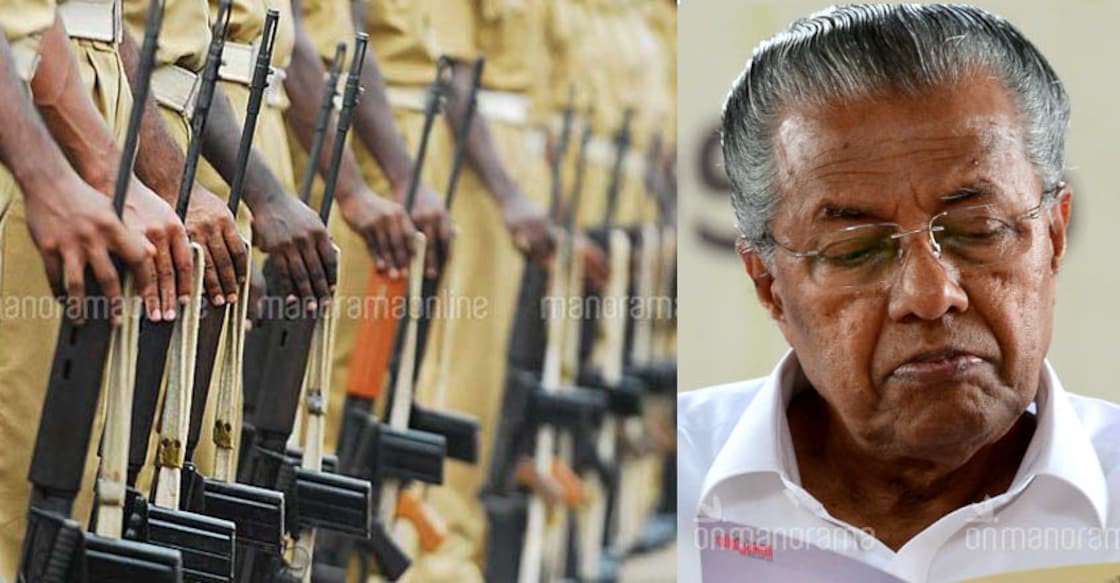Move to give Kerala police magisterial powers put on hold

Mail This Article
Chief minister Pinarayi Vijayan has virtually put on hold the roll out of the Police Commissionerate system that would have given IPS officers magisterial powers. “The government is in no haste to implement the system. It will be done only after holding wide discussions and evolving a consensus on the issue,” the chief minister said in the Assembly on Tuesday.
The chief minister also shot down one of the most crucial powers sought by the police force. Even if the Commissionerate with magisterial powers comes into force, Pinarayi Vijayan made it clear that his government had no intention of granting police the power to detain 'known goondas' under KAAPA (Kerala Anti-Social Activities (Prevention) Act). “This power was kept out of the list of powers to be transferred to the police even when the former UDF government had taken the policy decision to form the Metropolitan Police system,” the chief minister said.
(Under KAAPA, the police can only recommend that certain anti-socials have to be detained in the interest of peace. It is up to the district magistrate, the collector, to issue the detention order after considering the evidence submitted by the police. The police had always complained that this was so time-consuming a process that it undermined law and order in an area.)
The chief minister also sought to assuage the feelings of the IAS lobby. “What I had earlier said was that the police had to be given more powers even while retaining these powers with our district collectors,” the Chief Minister said. This was later questioned by the opposition saying it would create dual power centres, replacing firmness with anarchy.
Police as violator and judge
The chief minister spoke of consensus on the issue while replying to an adjournment motion on the repercussions of the Commissionerate system moved by Congress MLA V T Balram. Balram's main argument was that under such a system, both the complainant and the judge would be the same person. “It will take away the checks and balances envisaged in the Constitution,” Balram said.
According to him, the police were a prejudiced force. “It is modelled on the Irish constabulary and treats the public as enemies. So a non-uniformed civilian authority was a necessary safeguard against police excesses,” he said. “Just imagine what will happen if the power to conduct inquest is vested in the commissioner in a custody death case,” he said.
Custodial nightmare
Balram said that even now higher officers hand down detention targets under KAAPA to lower-level policemen. “Now, if the magisterial powers are given to the police, it will be the commissioner who will judge the appeal against these detentions,” Balram said. The chief minister, in his reply, said that police would not be given more powers under KAAPA.
Balram argued that the human rights record of the state police was highly suspect. He accused Vijay Sakhare, the IG who was appointed commissioner in Kochi, of custodial murder. “It is officially on record that the wounds on Sampath (an accused in the Puthur Sheela murder case who had died in custody on March 29, 2010) was caused by the baton of an IPS officer,” Balram said. Vijay Sakhare was then Palakkad SP. (The CBI had later exonerated Sakhare.)
Balram also recalled the deaths of Sreejith and Vinayakan to throw light on the brutality of the state police. “There was also the instance of an ADGP's daughter harassing a junior policeman. And now we have a CI who just took off to an unknown place unable to stand the demands of a senior any more,” he said.
Later, opposition leader Ramesh Chennithala said that it was a fake encounter that killed suspected Maoist C P Jaleel in Wayanad. Balram said official records showed that police officers were involved in 23 murders that took place under the LDF government. And more than 60 police officers are accused in custodial torture.
Following in Chandy's footsteps
Chief minister Pinarayi Vijayan did not bother to go for a point by point rebuttal of Balram's charges. He made it seem as if he was just implementing a decision already taken by the former Oommen Chandy government.
The chief minister said the UDF had taken a decision on the issue after getting the approval of the finance and law departments. “It was a considered decision taken by the former UDF government,” he said. Chennithala conceded the point.
“It is true that the UDF had taken a decision but we did not proceed with the policy as there was strong public opposition. The then opposition leader V S Achuthanandan, too, had wanted us to reconsider the decision. If we had decided to heed to public opinion, it just shows our exalted democratic sensibilities,” Ramesh Chennithala said.
He then tried to turn the tables on the LDF. “We took the decision on the basis of section 15 of the Kerala Police Act that was passed by Kodiyeri Balakrishnan. It was also known that the section was included at the insistence of Kodiyeri,” Chennithala said and asked: “Why was Kodiyeri so insistent on including section 15.”
(Section 15 of the Act deals with the formation of Metropolitan Police system in city areas.)
CM's lingering desire
The only time the chief minister seemed as if he was keen to go ahead with the Commissionerate system was when he replied to Balram's argument that the two Kerala cities did not have the requisite population for establishing the Commissionerate. Balram said the system could be established only in cities with a population of at least 10 lakh, hinting that both Kochi and Thiruvananthapuram had a far less population.
The chief minister but said that Kochi had a population of 18 lakh and Thiruvananthapuram, 20 lakh.

